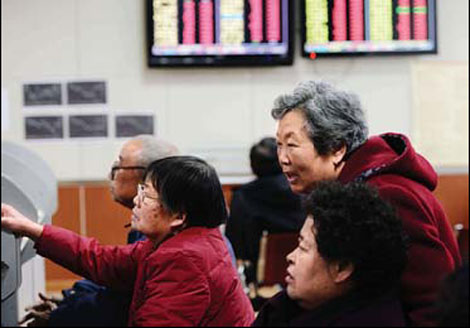
 |
| Investors at a brokerage in Qingdao, Shandong province, on Thursday. The Shanghai Composite Index rose 2.26 percent to close at 2365.59 points, the largest daily rise since Jan 28, led by the financial sector. Yu Fangping / For China Daily |
China's securities watchdog still has not set a date to allow new initial public offerings in the mainland stock market.
The China Securities Regulatory Commission, or the CSRC, said on Thursday that underwriters for pre-listed enterprises first must complete their re-evaluations of their companies' financial situations.
IPOs have been suspended for four months as the stock market continues to struggle. The Shanghai Composite Index dropped to a three-year low of 1949.46 points on Dec 4.
The benchmark index climbed 2.26 percent, or 52.37, to 2365.59 at the close of Thursday, the largest daily increase since Jan 28, led by the financial sector.
Some analysts said the CSRC may continue to postpone new IPOs until investors' confidence is restored.
"It is a necessary condition during the process that the financial intermediaries, including securities companies and accounting and law firms, should pass self-examination before IPO approvals," said an official from the IPO issuing management department of the CSRC.
On Jan 8, the commission said it will re-examine the finances of more than 800 companies that had submitted IPO applications.
As of Feb 21, the CSRC had terminated IPO examinations for 19 companies, still leaving 176 for listing at the Shanghai Stock Exchange and 693 for Shenzhen awaiting approval, the commission said.
The CSRC is planning to relieve the IPO logjam by developing a multilevel capital market, creating more channels for companies to raise funds.
Companies that don't satisfy the listing requirements now can apply to issue securities on the off-exchanges market, the so-called Third Board, because the financial benchmarks for listing are lower.
The new securities trading system was launched nationwide in January.
"According to the fresh regulation, companies in the over-the-counter market can turn to issue IPOs on the two exchanges in Shanghai and Shenzhen if they meet the requirements later," the CSRC official said.
"But it doesn't mean they can bypass the approval," he said. "The two stock exchanges will retain strict standards for listing."
More reform innovations will improve the IPO issuing system, the CSRC said.
Meanwhile, China Securities Finance Corp Ltd announced on Thursday it will launch a pilot program of lending and short selling stocks in the mainland, starting the "bidirectional trading system" in the A-share market.
The pilot program covers 11 securities companies, including CITIC Securities Co Ltd, Everbright Securities Co Ltd and GF Securities Co Ltd.
Stocks that can be short sold under the new mechanism are from 90 so-called blue-chip companies, which have a higher circulation market value and higher trading activity.
The total circulation market value of the 90 companies - 50 of which are on the Shanghai Stock Exchange and 40 in Shenzhen - is about 9.3 trillion yuan ($1.5 trillion), accounting for 50 percent of all the A shares.
Under the pilot program, those approved 11 brokers can borrow shares from China Securities Finance and lend the shares to qualified investors, most of which are institutional investors.
Analysts said that the short-selling mechanism is expected to curb irrational investment that chases rising stock prices, creating a better environment for issuing IPOs.
Yin Zhongli, a researcher from the Financial Research Institution of the Chinese Academy of Social Sciences, said that the Chinese stock market will enter into an era of short selling then.
"Usually, investors will choose overvalued shares to sell, waiting for the price decline to buy back and win profit," Yin said.
"It doesn't mean the stocks will decline straight away, but the new trading mechanism will adjust the market prices close to the real values," he added.
Currently, the market's valuation level of the 90 approved shares is close to or lower than the real value, which provides limited opportunity for short selling, Yin said.


















![]()
